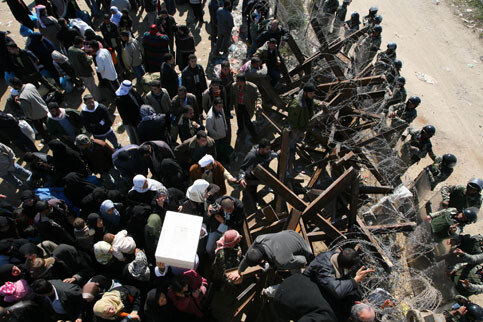The Electronic Intifada 29 February 2008

Palestinians and Egyptian riot police face each other across the border between Egypt and the Gaza Strip in the divided border town of Rafah, 4 Feburary 2008. (Wissam Nassar/MaanImages)
CAIRO, 27 February (IPS) - One month after throngs of Palestinians flooded into Egypt’s Sinai Peninsula from the Gaza Strip, the flashpoint Rafah border crossing remains tightly shut. But according to some opposition figures, the breach — viewed by many as a victory for Palestinian resistance faction Hamas — signaled the need for new border protocols consistent with shifting political realities.
“The recent crisis will inevitably lead to calls for a new Egypt-Palestinian security agreement regulating the border crossing at Rafah,” Abdel-Halim Kandil, political analyst and former editor-in-chief of Egyptian opposition weekly al-Karama told IPS.
On 23 January, an estimated half million Palestinians flocked into northern Sinai after the 14-kilometer wall separating Egypt from the Gaza Strip was destroyed in a series of explosions. Suffering under an almost two-year Israeli embargo of the territory, most of those crossing into Egypt seized the opportunity to buy essential foodstuffs and medicines.
All other means in or out of the Gaza Strip, governed by Hamas since June, have been hermetically sealed by Israel following the latter’s “disengagement” from the territory in 2005.
Citing Egypt’s humanitarian concern for the besieged strip’s roughly 1.5 million inhabitants, Cairo initially tolerated the influx. “Let them come in and buy food, as long as they aren’t carrying weapons,” President Hosni Mubarak said on the first day of the breach.
Nevertheless, the border was re-sealed on 3 February, after the bulk of itinerant Palestinians — most having stocked up on vital necessities unavailable in Gaza — had returned to their homes. As the Rafah crossing was officially closed in coordination with Hamas-affiliated police officers, limited clashes erupted at the border between some Palestinians and Egyptian security forces.
The breach contravened a 2005 US-brokered security arrangement between Tel Aviv and the West Bank-based Palestinian Authority (PA) regulating the administration of the Palestinian side of the Rafah crossing. The agreement, to which Cairo is not a signatory, mandates the presence of European observers at Rafah to monitor all movement in and out of the territory, and allows for constant surveillance of the crossing by Israel.
The mandated EU observers, however, have been absent from Rafah since June, having departed only days before Hamas took over governance of the Gaza Strip. Citing security concerns, they have not returned since, completely paralyzing all cross-border traffic.
Prior to the recent breach, Cairo — over the protestations of Hamas — had for the most part kept the Rafah crossing sealed in deference to the Israel-PA border understanding.
Local critics of the arrangement, however, say the deal relegates Egypt to the role of doorkeeper and makes Cairo complicit in Israel’s siege of the territory.
According to Kandil, the recent dramatic — if temporary — border breach could signal a chance for Egypt to “regain a measure of sovereignty” over its border with the Gaza Strip.
“Egypt could benefit by coming to a new, more realistic border agreement with the Palestinians,” Kandil said. “It might also be a chance for Egypt to increase the size of its sorely limited forces on the border.”
Under the current terms of the Egypt-Israel Camp David peace agreement, the Egyptian security presence on the border with the Gaza Strip is limited to a maximum of 750 border police.
Since the re-closure, Cairo has held separate talks with representatives of both Hamas and the PA, but has so far failed to reach a definitive border arrangement with either party.
PA officials insist on maintaining the 2005 agreement, and refuse to countenance a supervisory role for Hamas at the border. Hamas officials, meanwhile, have consistently denounced the agreement, and steadfastly reject an Israeli role in the administration of the crossing at Rafah.
Although the crossing remains tightly sealed, some local commentators say the recent border crisis yielded substantial political gains for Hamas. Along with physically breaking the Israel-imposed siege, they say, the incident has also compelled Cairo to hold talks with the resistance group.
“Cairo hasn’t officially recognized Hamas authority in Gaza until now, preferring instead to support the US-backed PA in the West Bank,” Gamal Zahran, political science professor at Suez Canal University and independent leftist MP, told IPS. “But after the border breach, Egypt realized that it must deal with Hamas — unofficially at least — to secure the border.”
On 23 February, Hamas representatives met with Egyptian security officials in the town of al-Arish, some 40 kilometers west of Rafah. While no definitive agreement was reached on new border protocols, Hamas officials announced shortly afterwards that Cairo had promised the release of scores of Palestinians recently detained in northern Sinai.
Other local observers, however, downplayed the notion that the political position of Hamas had been bolstered by recent events.
“Hamas didn’t reap any gains from the border crisis,” Emad Gad, analyst at the semi-official al-Ahram Centre for Political and Strategic Studies, and expert on Israeli affairs, told IPS. “Hamas merely forced a fait accompli on Egypt by unilaterally forcing open the crossing, but the border was quickly re-sealed.”
As for recent dialogue between Cairo and Hamas, he added: “Egypt, as a supporter of the Palestinian cause, is obligated to talk with Hamas about the border situation — the government won’t stand idly by while Gaza starves.”
All rights reserved, IPS - Inter Press Service (2008). Total or partial publication, retransmission or sale forbidden.
Related Links


